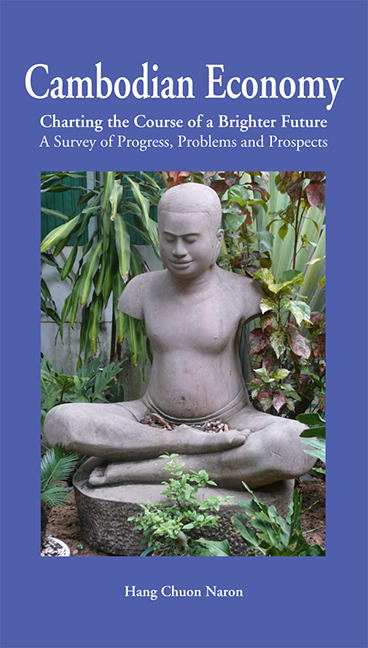 Cambodian Economy
Cambodian Economy Published online by Cambridge University Press: 21 October 2015
The overthrow of Prince Sihanouk by the Lon Nol coup d’état on March 18, 1970, plunged Cambodia into the horrors of war, genocide, and unbrid violence. The two decades that followed dramatically transformed the society and economy of Cambodia. The seizure of power by the Khmer Rouge on April 17, 1975 set Cambodia on course of genocide and self-extermination of its people. Cities were evacuated, hospitals emptied, schools closed, factories shut down, currency abolished, monasteries sealed off, and libraries destroyed. Life in Cambodia remained this way for three years, eight months, and twenty days. Cambodia's human resources were decimated. The Cambodian people were first kidnapped, and then besieged. The Khmer spirit was broken; its points of reference vanished.
The day of national redemption arrived on January 7, 1979, when the Front uni national de salut du Kampuchea (National United Front for the Salvation of Kampuchea), assisted by Vietnamese forces turned the tide against the Khmer Rouge. For many Cambodians this date celebrates the resurrection of Cambodia.
The Front immediately proclaimed the advent of the People's Republic of Kampuchea. The Cambodian people redoubled their efforts to reconstruct the country, organize the economy, set up the school system, reopen hospitals, and train management level staff. The first school to reopen its doors was Chaktaumuk, followed by Phnom Daun Penh (now Sisowath) Secondary School. The generation of my parents and parents-in-law worked ceaselessly to restore the educational system and save the Khmer culture. Furthermore, Fortunately many university students had left to continue their higher education abroad, especially in Eastern Europe. Many of them have returned to participate in rebuilding the nation.
Cambodia had to endure an economic embargo following the demise of the Khmer Rouge regime. The country had no access to international financial institutions; its currency was not convertible. Foreign aid from the Soviet Union, Viet Nam, and other countries of the Soviet bloc, as well as from some fifteen Western non- government organizations enabled the People's Republic of Kampuchea to begin the reconstruction of the economy and society.
To save this book to your Kindle, first ensure [email protected] is added to your Approved Personal Document E-mail List under your Personal Document Settings on the Manage Your Content and Devices page of your Amazon account. Then enter the ‘name’ part of your Kindle email address below. Find out more about saving to your Kindle.
Note you can select to save to either the @free.kindle.com or @kindle.com variations. ‘@free.kindle.com’ emails are free but can only be saved to your device when it is connected to wi-fi. ‘@kindle.com’ emails can be delivered even when you are not connected to wi-fi, but note that service fees apply.
Find out more about the Kindle Personal Document Service.
To save content items to your account, please confirm that you agree to abide by our usage policies. If this is the first time you use this feature, you will be asked to authorise Cambridge Core to connect with your account. Find out more about saving content to Dropbox.
To save content items to your account, please confirm that you agree to abide by our usage policies. If this is the first time you use this feature, you will be asked to authorise Cambridge Core to connect with your account. Find out more about saving content to Google Drive.